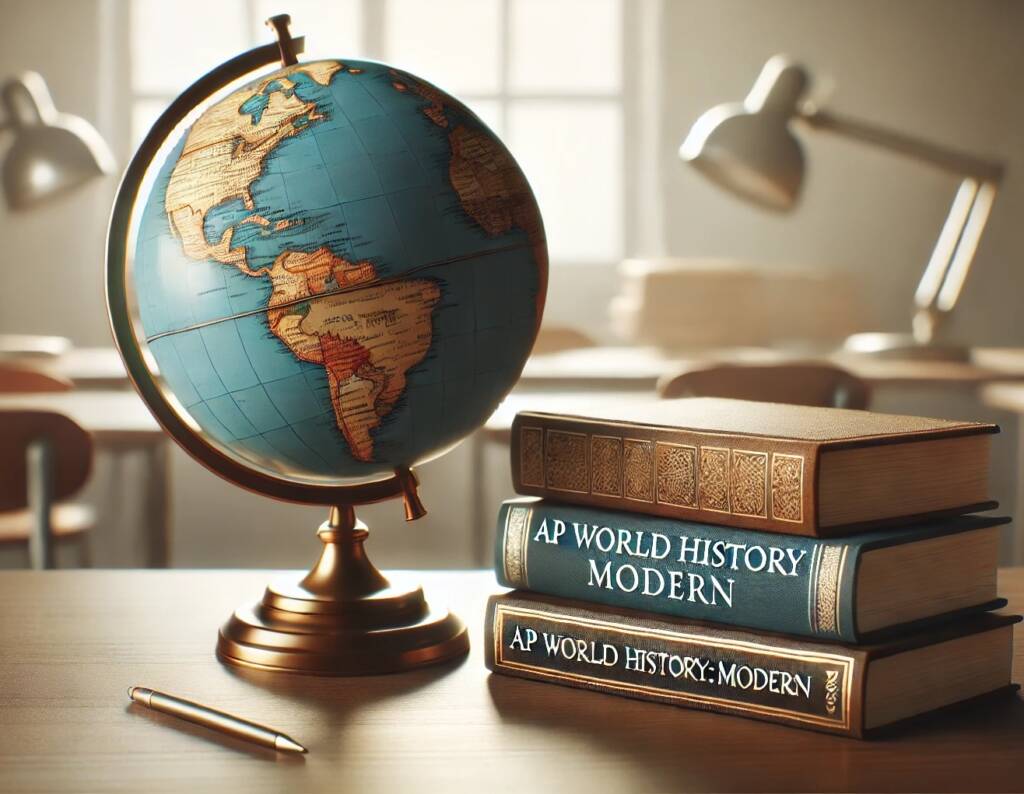
AP World History Modern

In AP World History: Modern, students will refine their analytical skills, specifically with respect to historical comparisons, causation, and continuity and change over time. They will hone these skills as they study world history from 1200 to the present—the past eight centuries of history. Students will explore this history through the driving themes of physical environment, human culture, systems of government, economic systems, social classes, and technological innovations.
Per College Board’s Appropriate Grade Level Policy – Students enrolling in AP courses with FLVS must be entering 9th grade to have AP designation affixed to their transcript at course completion. By signing up for an AP course with FLVS you are agreeing to College Board’s policy.
Major Topics and Concepts
Segment One
- Understanding the classical and post-classical eras
- Analyzing and comparing the cultures and governments of Song China, Dar al-Islam, Hindu Based South and Southeast Asia, the Americas, sub-Saharan Africa, and Europe
- Describing and explaining the development of the Abrahamic religions, Daoism, Confucianism, Hinduism, and Buddhism
- Recognizing the significance of the Mongol conquests to Afro-Eurasian history
- Comparing the Silk Roads, Indian Ocean Exchange, and Trans-Saharan Trade
- Recognizing the depth of the impact of the Black Death on Afro-Eurasian history
- Comparing the Ottoman, Mughal, and Safavid Empires
- Describing and analyzing the impact of the Protestant Reformations on Europe
- Describing and analyzing the impact of the Columbian Exchange and transoceanic empire-building on world history
- Comparing the impacts of technological maritime innovations, the printing press, and gunpowder weaponry on world history
- Describing and comparing the Enlightenment in its various forms from the 16th through 18th centuries
- Analyzing and comparing the American, French, Haitian, Latin American, and Springtime of Nations Revolutions
- Recognizing the significance of the Industrial Revolution as what is generally considered the most far-reaching change to human life since the development of farming some 10,000 years before
- Comparison and analysis of capitalism, socialism, and communism
- Describing and analyzing the gradual replacement of the aristocratic classes by the middle class
Segment Two
- Identifying and explaining the concept of nationalism and its dramatic increase in the 19th century
- Identifying and explaining the ways in which nationalism and industrialization effected a significant wave of new imperialism
- Describing and analyzing the impact of steam-powered international migration and the rise of global capital flows
- Analyzing and comparing the various reform movements, including abolitionism, women’s suffrage, and indigenous people’s rights, throughout the 19th century
- Describing and analyzing the alliances in the decades leading up to World War I
- Describing and analyzing the causes and course of World War I
- Identifying the consequences of World War I in the Russian Revolution, the economic struggles in the 20 years of the interwar period, and the dissolution of the Ottoman, Austrian, and German Empires
- Identifying and analyzing the roots of Japanese imperialism and the Sino-Japanese Wars
- Comparing the rise of totalitarian states in Italy, Germany, and Soviet Union
- Describing and analyzing the causes and course of World War II
- Identifying and comparing the mass atrocities against civilians from the Armenian genocide through the Chinese ethnic cleansing of the Uighurs in the 21st century
- Analyzing the causes and course of the Cold War
- Describing and analyzing the period of decolonization following World War II
- Describing and comparing the Cold War proxy conflicts, including the Berlin Airlift, Suez Conflict, Korean War, Vietnam War, Cuban Missile Crisis, and Malayan Emergency
- Identifying and analyzing the major technological advances of the 20th century, including the airplane, radio, telephone, atomic energy and weapons, Polio vaccine, digital computer, internet, and smartphone
- Identifying and analyzing the rise of globalizing institutions like the United Nations, World Trade Organization, and International Monetary Fund
- Identifying and analyzing ongoing sources of conflict, including the Arab-Israeli conflict, India-Pakistan tensions, China-Taiwan conflict, environmental concerns, and debates over economic systems
Course Materials
AP Course & Exam Registration Requirements
College Board requires students to register for AP exams no later than November 13th (individual schools may set earlier deadlines).
All VLACS AP students are required to enroll in the “course only” section in My AP. Instructions for joining My AP will be posted on each VLACS course page and instructors are available to help with this process.
Students who plan to take the corresponding AP exam must arrange to take the exam at a local school that administers it. To register for an AP Exam, the local school will enroll the student in an “exam only” section in My AP. Students should follow these steps:
- Search for a local test site through this resource of contact AP Services for Students at 888-225-5427 [email protected]. That office can give you contact information for local AP coordinators who may be willing to test outside students. Students are then responsible for contacting coordinators on that list to see if one can arrange to test for you. You should do this no later than October 2nd. Note that schools may have their own local deadlines for receiving requests from outside students to test at their school so we recommend doing this as soon as possible
- The AP coordinator who agrees to assist you must provide a join code for an “exam only” section in My AP. You’ll use the join code to join the section so that the AP coordinator can order your exam.
Please note that, if a school allows a student to register after the 11/13 deadline, there will be a $40 late exam fee. There will also be a $40 canceled/unused exam fee if a student registers and then cancels his/her exam or if the student does not show up on test day.
More information is available on the College Board’s website: https://apstudents.collegeboard.org/
Competencies
Land-Based Empires
Students will demonstrate an understanding of land-based empires from 1450 to 1750 by evaluating major technological changes, comparing the policies of land-based empires, and analyzing changes in cultural belief systems.
Origins of Major World Societies
Students will demonstrate an understanding of the origins of major world societies by comparing world regions from 1200 to 1450, analyzing the relationship between states and cultural beliefs, and evaluating major world events before 1450.
The Age of Revolutions
Students will demonstrate an understanding of the influences of revolutions from 1750 to 1900 by analyzing the importance of the European Enlightenment, evaluating the relationship between political revolutions and nationalism, and analyzing the role of the Industrial Revolution in transforming society.
Trade Across Lands and Seas
Students will demonstrate an understanding of the trade routes of Afro-Eurasia by comparing major trade routes from 1200 to 1450, analyzing the impact of economic exchange and cultural diffusion, and evaluating the environmental impacts of exchange networks.
Transoceanic Empires
Students will demonstrate an understanding of transoceanic empires from 1450 to 1750 by evaluating the Age of Exploration, analyzing the effects of the Columbian Exchange, and analyzing the development of a global economy.
Aftermath of World War II
Students will demonstrate an understanding of the aftermath of World War II by analyzing the origins of the Cold War, summarizing the development of Cold War proxy conflicts, and evaluating the impact of decolonization.
Globalization from 1900 to the Present
Students will demonstrate an understanding of globalization from 1900 to the present by analyzing the influences of technological transformations, evaluating the relationship between economic and cultural globalization, analyzing the impact of global reform movements, and explaining the importance of an international community.
History's Deadliest Wars
Students will demonstrate an understanding of the first half of the 20th century by summarizing the importance of World War I, evaluating the impact of the Great Depression, analyzing the events of World War II, and analyzing 20th-century mass atrocities.
Industrialization Transforms the World
Students will demonstrate an understanding of the Industrial Revolution's transformation of the world by analyzing the development of 19th-century imperialism, analyzing Indigenous resistance movements, evaluating the division of world economies, and evaluating the impact of the development of economic ideologies.

